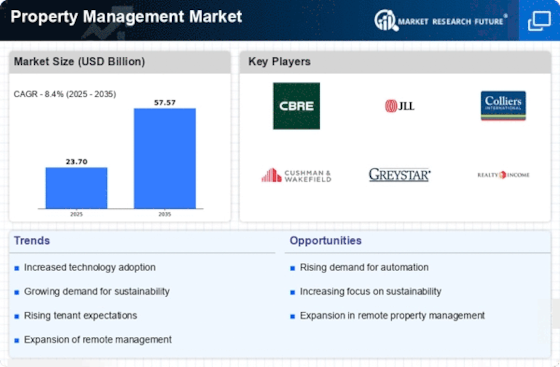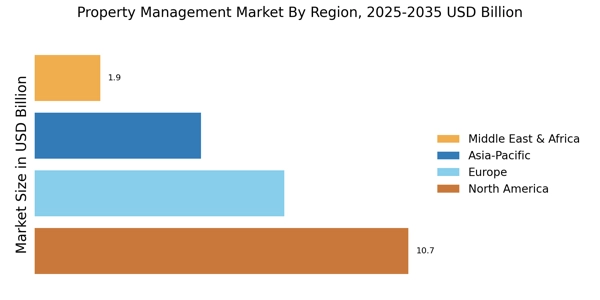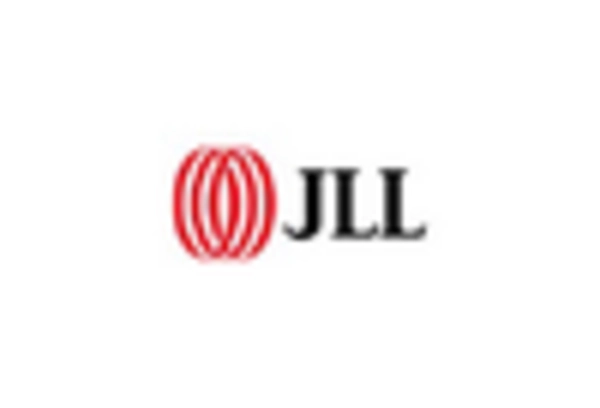Increased Focus on Sustainability
Sustainability initiatives are gaining traction within the Property Management Market, as both property owners and tenants prioritize environmentally friendly practices. The demand for sustainable properties is on the rise, with many tenants seeking energy-efficient buildings that reduce their carbon footprint. Property management firms are responding by implementing green building practices, such as energy-efficient appliances, water conservation systems, and sustainable landscaping. According to industry reports, properties with sustainable features can command higher rental prices and attract a more environmentally conscious tenant base. This shift towards sustainability not only benefits the environment but also enhances the marketability of properties, making it a crucial driver in the Property Management Market. As awareness of climate change grows, the emphasis on sustainability is expected to continue influencing property management strategies.
Growth of Short-Term Rental Markets
The growth of short-term rental markets is emerging as a significant driver within the Property Management Market. Platforms such as Airbnb and Vrbo have transformed the way properties are rented, leading to an increase in demand for property management services tailored to short-term rentals. Property management firms are now tasked with managing bookings, guest communications, and property maintenance for these rentals, which often require a different approach compared to traditional long-term leasing. Data indicates that the short-term rental market is expected to grow at a rate of 7% annually, presenting lucrative opportunities for property management companies. This trend not only diversifies revenue streams for property managers but also necessitates the development of specialized services to cater to the unique needs of short-term rental properties, thereby influencing the Property Management Market.
Rising Demand for Rental Properties
The Property Management Market is currently experiencing a notable increase in demand for rental properties. This trend is driven by various factors, including urbanization and changing demographics. As more individuals and families opt for rental living due to flexibility and affordability, property management services are becoming essential. According to recent data, the rental market is projected to grow at a compound annual growth rate of approximately 4.5% over the next five years. This growth indicates a robust opportunity for property management firms to expand their services and cater to a diverse clientele, including millennials and retirees seeking rental options. Consequently, the rising demand for rental properties is a significant driver influencing the Property Management Market.
Regulatory Changes and Compliance Requirements
The Property Management Market is significantly influenced by regulatory changes and compliance requirements. Governments are increasingly enacting laws and regulations that affect property management practices, including tenant rights, safety standards, and fair housing laws. Property management firms must stay abreast of these changes to avoid legal repercussions and ensure compliance. For instance, recent legislation in various regions has introduced stricter regulations regarding tenant screening and eviction processes. This evolving regulatory landscape necessitates that property management companies invest in training and resources to navigate compliance effectively. As such, the ability to adapt to regulatory changes is a vital driver in the Property Management Market, shaping operational strategies and influencing market dynamics.
Technological Advancements in Property Management
Technological advancements are reshaping the Property Management Market, offering innovative solutions that enhance operational efficiency. The integration of property management software, mobile applications, and smart home technologies is becoming increasingly prevalent. These tools enable property managers to streamline processes such as tenant screening, maintenance requests, and rent collection. Data suggests that the adoption of technology in property management can reduce operational costs by up to 30%, thereby improving profitability for property management firms. Furthermore, the growing reliance on data analytics allows property managers to make informed decisions, optimize property performance, and enhance tenant satisfaction. As technology continues to evolve, its impact on the Property Management Market is likely to intensify, creating new avenues for growth and efficiency.

















